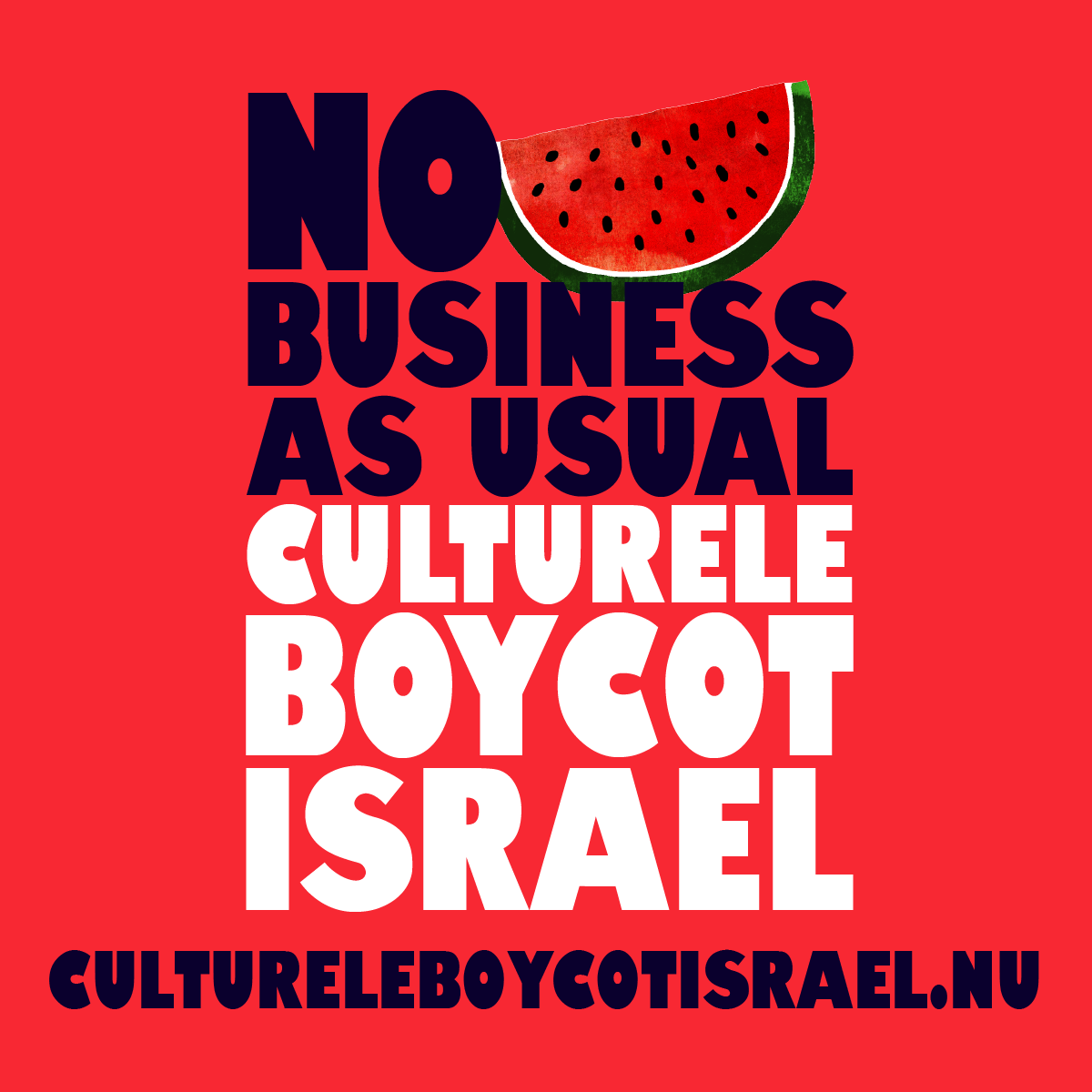Culturele Boycot Israel: No Business As Usual
What does the cultural boycott entail?
We support the boycott
We will not (further) participate in art projects funded by the Israeli state (or complicit organisations)
We will not enter into new collaborations with such parties
We will not participate in practices that treat Israeli and Palestinian perspectives as “equal” without addressing the history of injustice and oppression
The boycott is directed at the Israeli state and all Israeli institutions and companies. Exceptions are organisations that are not complicit in violations of international law and have unequivocally spoken out against the 𝘨𝘦𝘯𝘰𝘤𝘪𝘥𝘦, the illegal occupation and apartheid. The boycott is explicitly not directed at individuals or their origin, including Israelis as such, but at the complicity of Israeli institutions and companies in human rights violations against Palestinians.
No Business As Usual
Dutch and Belgian artists and cultural institutions boycott Israel We, members of the Dutch and Belgian cultural sector, no longer wish to stand on the sidelines of war crimes, crimes against humanity and genocide against the Palestinian people, as recognised by all authoritative institutions.
With immediate effect, and in response to persistent calls from Palestinian artists and Palestinian society, we are imposing a cultural boycott on the State of Israel and all Israeli institutions and companies. Exceptions are made for organisations that are not complicit in violations of international law and have unequivocally spoken out against genocide, the occupation, which has been declared illegal, and apartheid. The boycott is explicitly not directed at individuals or their origins, including Jews or Israelis as such, but at the complicity of Israeli institutions and companies in human rights violations against Palestinians.
For decades, artists around the world have spoken out against Israel's gross violations of human rights. After nearly two years of genocide in Gaza, characterised by military violence, starvation and the destruction of medical and educational infrastructure, Israel has since March 2025 escalated its violence even further, leading to the total destruction of the Gaza Strip. Every form of Palestinian culture is being destroyed: churches, mosques, educational institutions, libraries and cultural heritage are primary targets, as are journalists, humanitarian aid workers, medical professionals and artists. In the West Bank and Jerusalem, too, the lives of Palestinians are increasingly being made impossible. This is only the latest phase of a decades-long policy that has systematically oppressed, marginalised and driven out the Palestinians.
In recent weeks, collective actions against Israel's genocidal violence have been following one another in quick succession. Five countries, including the Netherlands, are refusing to participate in the Eurovision Song Contest if Israel remains a participant. In the film world, more than 5,000 international professionals have declared that they will no longer work with Israeli institutions. More than 400 artists have joined the No Music For Genocide campaign and blocked their own music on streaming services in Israel. And in Flanders, the Minister of Culture himself has called for a cultural boycott of the country.
We build on the experience of the cultural boycott of South Africa, which contributed to the collapse of that country's apartheid policy. We stand in solidarity with our Palestinian colleagues who have lost loved ones and been driven from their homes, and with our Israeli colleagues who are fighting side by side with us for justice for the entire Palestinian people.
A cultural boycott will not be enough to stop the genocide and occupation. Following existing calls from Palestinians, we therefore also ask the sports sector, academia, the economic sector and politicians to sever ties. Only together can we force Israel to comply with international law.
This boycott is not a decision taken lightly. The cultural sector is built on the conviction that artistic exchange makes the world a better place, or at least does no harm. However, business as usual is no longer an option: impunity must end.

